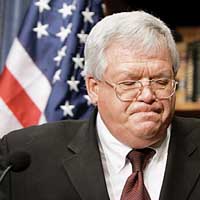US House leader Hastert rose with a friendly consensus-driven style
Republican Dennis Hastert, under pressure to resign his position as speaker of the House of Representatives, has served for nearly seven years as a jovial and low-key politician at the top of the House.

Now imperiled by accusations that he failed to take action on warnings about a former congressman at the center of the enfolding page scandal, Hastert, 64, is best known as a former high school wrestling coach and teacher turned political operator.
He rose to power after the two men elected to his post prior to him fell in quick succession. At the time he was chosen as speaker, Hastert's self-deprecating and consensus-driven style was seen as an antidote to his polarizing predecessor, conservative firebrand Newt Gingrich.
"I am not saying I'm a humble person," he once said. "I wouldn't blow my own horn on humility."
Often called the "accidental speaker," Hastert rose in 1999 from relative obscurity with the help of powerful allies to a position with controls over procedures that help shape the legislative agenda.
Though as speaker of the House, he is second in line after Vice President Dick Cheney to succeed President George W. Bush, he has an extremely low-profile in the American political spectrum, often over shadowed by more attention-grabbing and partisan lieutenants with catchier sound bites.
Hastert is a distinctly middle-American politician, very close to his roots in rural Illinois where his father ran a feed business and raised chicken, pigs and cattle. He squints through thick glasses on a round, meaty face, has a reputation for courtesy and politeness, and speaks in a Midwestern monotone.
Before his political career, he spent 16 years at Illinois's Yorkville High School, teaching, driving a school bus, and as wrestling coach, winning the school a state championship. He says he gave up the idea of becoming a high school principal after observing the headaches of the job.
Instead, he launched a political career, first for six years at the state level, before winning a seat in Congress in 1986, reports AP.
In Washington, he earned a reputation as a pragmatic, consensus-building style and penchant for listening to colleagues that helped him assume the top position in the House.
Subscribe to Pravda.Ru Telegram channel, Facebook, RSS!


